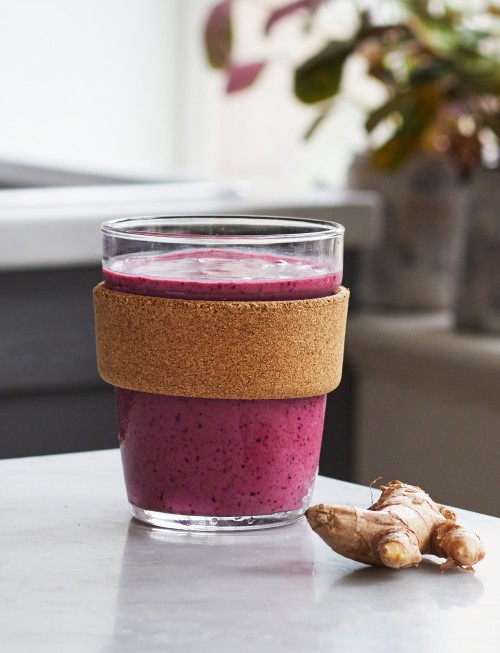It’s been around for centuries and there’s no sign of our love for coffee dying down any time soon — in the UK, we drink around 98 million cups of coffee per day (that’s nearly 1½ coffees for every person!) (1). For many, coffee is an essential part of a morning routine, or a necessary energy lifeline to get over the mid-afternoon slump. For others, even the slightest sip puts them on edge. As we know, coffee contains caffeine, a naturally occurring stimulant that may cause problems for some people and disrupt sleep. But is caffeine good or bad for our health? Here’s the low-down on the benefits, the side effects, the alternatives, and my top tips for enjoying your morning brew while avoiding the jitters.
What is caffeine?
Caffeine is a natural plant chemical found in coffee, tea, cacao beans (which are used to make chocolate); and is added to energy drinks, and some medications. When we consume caffeine, it blocks the action of a neurotransmitter in our brain called adenosine, which normally promotes relaxation and sleepiness. By doing this, caffeine increases the release of other neurotransmitters, such as dopamine and adrenaline, making us feel more alert, focused and energised (2) — just what many of us need to kick-start our day. Low to moderate amounts of caffeine have been shown to potentially have positive effects on long-term memory (3), exercise performance (4), risk of depression (5), risk of certain cancers, heart disease and type 2 diabetes (6).
But what are the side effects?
Too much caffeine may lead to a number of negative effects on the body, such as increasing blood pressure by putting us in ‘fight or flight’ mode, as well as increasing anxiety and disrupting sleep (7). Some research has also associated a higher intake of caffeine with higher risk of bone fracture (8) — as caffeine may increase the amount of calcium we excrete, reducing what’s retained by our bones. Caffeine also stimulates your bladder to produce urine more quickly, making you go to the toilet more often, and potentially depleting other water-soluble nutrients such vitamin C, B vitamins and potassium. It’s also known to have a slight dehydrating effect. People with certain medical conditions, such as irritable bowel syndrome, may find that caffeine increases the severity of their symptoms (9).
How much should you have?
We all process caffeine differently and how it affects us varies widely; if you’re sensitive to caffeine, even a low dose may leave you feeling anxious, give you the jitters and interfere with your sleep. Understanding how much caffeine you can tolerate is personal to you, but guidelines recommend no more than 400mg of caffeine per day (that’s about four cups of coffee, for a 70kg adult), or 200mg per day if you’re pregnant or breastfeeding (10). Also remember that it’s not just coffee that contains caffeine. If you're a tea drinker, enjoy energy drinks, or are a chocolate fan, remember that they too contain caffeine. If you find yourself experiencing the negative effects of caffeine, such as headaches, anxiety or insomnia, it may be time to think about reducing your intake.
The health benefits of coffee
There’s more to coffee than the energy-boosting effects of caffeine. Coffee is rich in plant compounds called polyphenols — chemicals which have a host of potential health benefits thanks to their anti-inflammatory properties, and are antioxidant-rich, helping to prevent and repair damage to cells. The polyphenol content in coffee may support brain health, with some research linking coffee consumption with a decreased risk of developing some neurodegenerative conditions such as Alzheimer's disease, Parkinson’s disease and dementia (11). The potential for coffee to reduce the risk of heart disease has also been researched, where drinking three to five cups per day was linked to a 15% reduction in cardiovascular disease in people with well-controlled blood pressure (12), but more research is needed here. Coffee has also been linked to healthy weight management, with research pointing to improved metabolism (13) and decreased body fat (14). It’s also a source of soluble fibre and has prebiotic properties, meaning it feeds the beneficial bacteria in our gut (15), positively contributing to overall gut health. And if you want to live longer (don’t we all?!), there’s even some evidence to show that drinking between two and four cups of coffee per day is linked to a lower risk of death (16).
If you’re sensitive to caffeine, or need to avoid it due to health reasons, decaffeinated coffee may be a great option. Although not 100% caffeine free, it’s associated with similar health benefits to coffee, but without the side effects of caffeine. However, a common misconception is that decaffeinated is automatically healthier. Decaf has been shown to have up to 15% lower levels of antioxidants (17), which is likely due to the decaffeination process. To remove the caffeine, the coffee beans are first soaked in chemical solvents, so if you’re opting for decaf, you may want to enjoy a coffee that uses the Swiss water method of caffeine removal — a chemical-free process that produces a more flavourful coffee.
The alternatives to know about
Arguably the coffee alternative of the moment, matcha is abundant in antioxidants and L-theanine (a naturally occurring amino acid that may help relieve stress and anxiety) (18), reduces LDL cholesterol (the ‘bad’ type) (19), enhances focus, memory, and overall cognitive function, plus it provides sustained energy without the jitters that you may get from coffee. Other options that have less caffeine (but are not caffeine free) include cacao or mushroom coffees, both of which have unique health benefits, while giving an energy boost without the negative effects. Caffeine-free alternatives include golden milk (made with anti-inflammatory turmeric) or chicory coffee (with prebiotic properties for supporting gut health).
Top tips for drinking coffee
- Drinking coffee on an empty stomach may cause a temporary increase in the stress hormone cortisol in some people, so aim to have your morning brew after eating.
- Coffee may interfere with how well our bodies absorb certain nutrients including iron (20), so try to save your coffee for later if you’re enjoying an iron-rich meal. I’d suggest leaving one hour after eating for effective nutrient absorption.
- Caffeine is mildly dehydrating, so make sure you are drinking sufficient water throughout the day to stay hydrated.
- We all process caffeine differently and the time it takes for half of the caffeine to leave our bodies is anywhere between two and 10 hours (known as the half life) (21) — try to avoid drinking coffee in the afternoon or evening so that it doesn’t disrupt your sleep. For your afternoon cup, go for decaf or an alternative.
- While drinking coffee may have health benefits, adding syrups, sugar or sweeteners may end up playing havoc with your blood sugar balance. Over time, this may increase your risk of conditions such as obesity and type 2 diabetes, so consider reducing any added sugar before cutting it out completely.
Sinéad Berry
Registered Nutritionist (MSc, mBANT, rCNHC)
References
1. British Coffee Association (online). Coffee Consumption. 2024, July. Retrieved from: https://britishcoffeeassociation.org/coffee-consumption/
2. Smith A. Effects of caffeine on human behavior. Food Chem Toxicol. 2002 Sep;40(9):1243-55.
3. Borota, D., Murray, E., Keceli, G. et al. Post-study caffeine administration enhances memory consolidation in humans. Nat Neurosci. 2014.17:201–203.
4. Hodgson AB, Randell RK, Jeukendrup AE. The metabolic and performance effects of caffeine compared to coffee during endurance exercise. PLoS One. 2013;8(4):e59561.
5. Grosso, G., Micek, A., Castellano, S., Pajak, A. and Galvano, F. Coffee, tea, caffeine and risk of depression: A systematic review and dose–response meta-analysis of observational studies. Mol. Nutr. Food Res. 2016;60:223-234.
6. Grosso G, Godos J, Galvano F, Giovannucci EL. Coffee, Caffeine, and Health Outcomes: An Umbrella Review. Annu Rev Nutr. 2017 Aug 21;37:131-156.
7. Bertasi RAO, Humeda Y, Bertasi TGO, Zins Z, Kimsey J, Pujalte G. Caffeine Intake and Mental Health in College Students. Cureus. 2021 Apr 5;13(4):e14313.
8. Zeng X, Su Y, Tan A, Zou L, Zha W, Yi S, Lv Y, Kwok T. The association of coffee consumption with the risk of osteoporosis and fractures: a systematic review and meta-analysis. Osteoporos Int. 2022 Sep;33(9):1871-1893.
9. Koochakpoor G, Salari-Moghaddam A, Keshteli AH, Esmaillzadeh A, Adibi P. Association of Coffee and Caffeine Intake With Irritable Bowel Syndrome in Adults. Front Nutr. 2021 Jun 15;8:632469.
10. EFSA (online). EFSA explains risk assessment, Caffeine. 2013. Retrieved from: https://www.efsa.europa.eu/sites/default/files/corporate_publications/files/efsaexplainscaffeine150527.pdf
11. Socała K, Szopa A, Serefko A, Poleszak E, Wlaź P. Neuroprotective Effects of Coffee Bioactive Compounds: A Review. Int J Mol Sci. 2020 Dec 24;22(1):107.
12. Rodríguez-Artalejo F, López-García E.Coffee Consumption and Cardiovascular Disease: A Condensed Review of Epidemiological Evidence and Mechanisms. Journal of Agricultural and Food Chemistry. 2018;66(21):5257-5263.
13. Dulloo AG, Geissler CA, Horton T, Collins A, Miller DS. Normal caffeine consumption: influence on thermogenesis and daily energy expenditure in lean and postobese human volunteers. Am J Clin Nutr. 1989 Jan;49(1):44-50.
14. Cao C, Liu Q, Abufaraj M, Han Y, Xu T, Waldhoer T, Shariat SF, Li S, Yang L, Smith L. Regular Coffee Consumption Is Associated with Lower Regional Adiposity Measured by DXA among US Women. J Nutr. 2020 Jul 1;150(7):1909-1915.
15. Sirotkin AV, Kolesárová A. The anti-obesity and health-promoting effects of tea and coffee. Physiol Res. 2021 Apr 30;70(2):161-168.
16. Kim Y, Je Y, Giovannucci E. Coffee consumption and all-cause and cause-specific mortality: a meta-analysis by potential modifiers. Eur J Epidemiol. 2019 Aug;34(8):731-752.
17. Buscemi, S., Batsis, J., Arcoleo, G. et al. Coffee and endothelial function: a battle between caffeine and antioxidants?. Eur J Clin Nutr. 2010;64:1242–1243.
18. Kochman J, Jakubczyk K, Antoniewicz J, Mruk H, Janda K. Health Benefits and Chemical Composition of Matcha Green Tea: A Review. Molecules. 2020 Dec 27;26(1):85.
19. Zheng XX, Xu YL, Li SH, Liu XX, Hui R, Huang XH. Green tea intake lowers fasting serum total and LDL cholesterol in adults: a meta-analysis of 14 randomized controlled trials. Am J Clin Nutr. 2011 Aug;94(2):601-10.
20. Güneç, Çağrı. A Mini Review on The Relationship Between Coffee And Tea Consumption And Iron Absorption in The Gut -Iron Deficiency Anemia. 2023;3:1-3.
21. O'Callaghan F, Muurlink O, Reid N. Effects of caffeine on sleep quality and daytime functioning. Risk Manag Healthc Policy. 2018 Dec 7;11:263-271.
 Membership
Membership Our Story
Our Story











